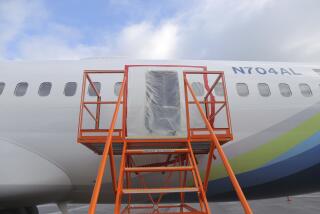Federal inquiry takes aim at BP’s corporate culture on safety
- Share via
Reporting from Houston — Federal investigators Thursday hammered away at a corporate culture at BP that they said had failed to learn from deadly accidents and other incidents, including the Texas City refinery explosion in 2005 that killed 15 workers.
The panel investigating the April 20 Deepwater Horizon rig disaster, which killed 11 workers and started the worst offshore oil spill in U.S. history, portrayed the oil giant as ignoring past mistakes and not effectively emphasizing safety.
“If you don’t change the safety culture for the entire company, you’re going to have incidents,” lead investigator Hung Nguyen told a BP executive as the joint Coast Guard- Interior Department hearings continued in Houston.
“We’re concerned about BP’s supervision, their expertise and their control on the rig,” investigator Jason Mathews said.
Nguyen, a Coast Guard captain, admonished BP senior officials for failing to offer a satisfactory explanation of who was responsible for ensuring safety for the company’s deep-water operations.
“Who has the total awareness and accountability of the safe operations of BP’s deep-water operations?” Nguyen asked Kent Wells, a BP senior vice president.
“We try to have everyone worry about safe operations,” Wells said.
“So if everybody is in charge, nobody is in charge? Is that correct?” Nguyen asked.
“I disagree when it comes to safety,” Wells said. “I think we want to have everybody feeling like they can stop a job.”
Nguyen was incredulous, maintaining that BP’s confusing command structure proved to be a key flaw in the Gulf of Mexico well blowout.
“At the end of the day ... nobody has a good awareness of what’s going on. And nobody is making that next step to make the right decision,” Nguyen said.
Nguyen questioned whether BP had learned from its past disasters, including a rig fire in 2002 and the Texas City, Texas, refinery explosion.
Wells said the company made safety improvements after the refinery explosion, such as technical upgrades and moving buildings farther away from the refinery.
“It’s not about the equipment improvement. It’s about the safety culture,” Nguyen said. “These things keep happening. My concern is you have not changed the safety culture.”
Nguyen asked whether BP had disciplined anyone for the rig fire, the refinery explosion or the Deepwater Horizon disaster.
Wells cited outgoing BP Chief Executive Tony Hayward’s departure, but later acknowledged he didn’t know whether Hayward had been ousted or left on his own. Wells could not list anyone else who had been disciplined.
BP had already been sharply criticized for its safety record after two incidents in the Gulf of Mexico in 2002: the rig fire and a pressure buildup in the same oil field that forced that rig’s crew to evacuate.
Wells was asked to read the text of a 2003 letter from federal regulators:
“These incidents seem to have root causes related to incomplete planning, poor communication, insufficient knowledge or training, and a lack of effective supervision,” Wells read. “The circumstances surrounding these incidents have raised questions about the ability of BP to safely conduct drilling operations in the Gulf of Mexico.”
Investigators also pointed to an admonition in the same letter over BP’s supervision of its contractors and referenced a meeting among Houston-based BP leaders to encourage its rig officials to avoid calling Houston for help.
Testimony on Thursday also showed that five high-ranking BP officials supervising the well drilling by the Deepwater Horizon each had less than six months of experience in their jobs.
ron.lin@latimes.com
More to Read
Sign up for Essential California
The most important California stories and recommendations in your inbox every morning.
You may occasionally receive promotional content from the Los Angeles Times.














